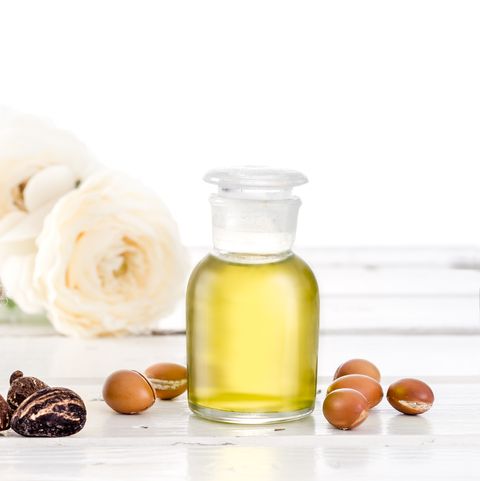All the Ways Argan Oil Benefits Your Skin and Hair
Here's how the golden-hued oil can boost your glow.

In the beauty world, argan oil—also marketed as Moroccan oil—is so handy that it’s often referred to as “liquid gold." The nickname stems not only from its amber color, but also for the valuable ways argan oil benefits your hair, skin, and face.
This powerful product is extracted from the nut of fruits from the argan tree, exclusively found in the foothills of the Atlas Mountains in the southwestern region of Morocco, Africa.
Although it seems like argan oil burst onto the beauty scene only a few decades ago, Moroccan women have been producing—and using the product—for thousands of years. “Berber women, an indigenous ethnic tribe of North Africa, have been integrating argan oil into their routines, applying it regularly to the face, nails, and hair, since at least 600 BCE” says Jenefer Palmer, founder of OSEA, a non-toxic cosmetics company.
Ready to test the potential argan oil benefits for yourself? Here's what dermatologists say you can expect.
Argan oil helps moisturize dry, flaky skin.
Thanks to high levels of vitamin E and essential fatty acids (namely, oleic acid and linoleic acid) argan oil has extremely hydrating effects for dry skin, says Paul Dean, M.D., of Grossmont Dermatology Medical Clinic and founder of SkinResourceMD.com. The antioxidants in argan oil can also be helpful for people with skin conditions like eczema, he notes.
And, it helps other products absorb into your skin.
“Argan oil is rich in oleic acid, which can improve skin permeability and assist with other ingredients penetrating the skin barrier,” says Susie Wang, expert skincare chemist and co-founder of 100 Percent Pure.“To seal in hydration and give skin an extra boost of moisture, apply one to two drops of argan oil afteryour daily moisturizer,” suggests Joshua Ross, a celebrity aesthetician with SkinLab. This is especially beneficial after plane travel.
Argan oil may help prevent wrinkles, too.
The omega fatty acids in argan oil help to strengthen tissues in skin and therefore can aid in wrinkle prevention, explains Ross. A 2014 study found that women who applied argan oil to their skin and consumed it improved their skin’s ability to retain water (a key to reducing signs of aging). Researchers further determined that it wasn’t just skin-deep, but actual deep cell-level change.
To up the anti-aging powers, look for products that combine argan oil with ceramides. “Argan oil's fatty acids work even better on skin when they’re combined with ceramides, which also helps protect the lipid barrier of the skin," says Ross.
Acne prone? You can still use argan oil.
Although it may not seem like you’d want to slather oil on top of acne, argan oil can actually help pimple-prone skin. Often, people tend to break out not because their skin is naturally oily, but because their skin is inflamed, dry, and damaged, Wang explains. "One of the major fatty acids in argan oil—linoleic acid—can help reduce inflammation, soothe skin, and improve moisture."
Argan oil doubles as a hair product.
Because it's high in essential fatty acids, argan oil can improve the health of your scalp. "Our scalp is where the cells that create our hair is located, and in order to have healthy hair, you need to have healthy scalp," Sivak explains.
To help the essential fatty acids reach your scalp, try this: Add 1-3 drops of oil (depending on your hair length—a little goes a long way) to your palms, and warm the oil by rubbing your hands together, suggests Elena Duque, an esthetician and owner of BodyBrite Bayside. Apply from the roots to the ends, and massage any excess into your scalp. This can help to help fight dandruff and an itchy scalp, mend split ends, and even promote hair growth.
And it can make your hair color last longer.
“The antioxidants found in argan oil are especially beneficial for color treated hair to prevent loss of pigment,” Ross notes. An easy way to introduce it is by adding 1-2 drops and lightly running your fingers through your hair after styling or just adding it to the ends. Err on the conservative side as to not make the hair greasy, he notes.
Argan might have cardiovascular benefits.
Research suggests that argan oil can effectively reduce the risk of cardiovascular disease thanks to its high concentration of oleic and linoleic acids, Wang says.
Other studies have found argan oil may be helpful in combating certain cancers, although more research is needed. Researchers credit these health benefits to the heart-healthy acids in argan oil, as well as anti-inflammatory compounds such as vitamin E, CoQ10, and polyphenols.
Here's what type of argan oil to look for:
Only buy products that are labeled "100% Pure Argan Oil," experts suggests. “Avoid using products where argan oil is a minor ingredient (i.e. listed low on the ingredient list) or products full of synthetic ingredients that are hard to pronounce and sound unfamiliar,” Wang says.
In order to avoid skin irritation, purchase argan oil products that are fragrance-free, Dean suggests. This is especially important for people with sensitive skin, since fragrance can be a big cause of contact dermatitis and skin irritation.






